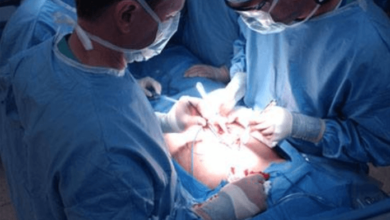Head and Neck Surgeon: Navigating the Path to Better Health

In the realm of medical professionals, a head and neck surgeon holds a pivotal role in diagnosing and treating various conditions related to the head and neck area. This article delves into the responsibilities, educational journey, common conditions treated, and the advancements in head and neck surgery. Let’s embark on a journey to understand the life-changing work of these specialized medical experts.
The Role of a Head and Neck Surgeon
A head and neck surgeon is a highly specialized medical professional who focuses on treating conditions that affect the head and neck region. These areas include the mouth, throat, larynx, salivary glands, thyroid, parathyroid, and more. Their expertise covers a wide range of medical issues, including cancer, infections, congenital anomalies, and trauma. The primary goal of a head and neck surgeon is to provide comprehensive care, from diagnosis to treatment, for patients suffering from such conditions.
Educational Background and Training
Becoming a head and neck surgeon is a rigorous journey that requires dedication and commitment. After completing a bachelor’s degree, aspiring surgeons undergo four years of medical school, followed by a residency program in otolaryngology-head and neck surgery, which lasts five years. This extensive training equips them with the knowledge and skills needed to address complex issues in the head and neck region.
Common Conditions Treated
Head and neck surgeons are proficient in diagnosing and treating a wide range of conditions. These may include:
a. Head and Neck Cancer
Head and neck cancers can affect various areas, such as the throat, mouth, and thyroid. Surgeons play a vital role in cancer diagnosis and devising treatment plans.
b. Chronic Sinusitis
Chronic sinusitis can cause persistent facial pain, congestion, and impaired breathing.
c. Thyroid Disorders
Surgeons treat thyroid conditions, including goiter, nodules, and thyroid cancer. Thyroid surgery may be required to address these issues.
Signs and Symptoms
Recognizing the signs and symptoms of head and neck conditions is crucial for early diagnosis. Common indications include:
- Persistent sore throat
- Difficulty swallowing
- Changes in voice
- Lump or mass in the neck
- Chronic sinus issues
Prompt medical attention is essential if any of these symptoms persist.
Diagnosis and Assessment
Head and neck surgeons employ various diagnostic tools, such as endoscopy, imaging studies, and biopsies, to pinpoint the exact nature of a condition. This thorough assessment guides the treatment plan.
Treatment Options
Treatment options can vary based on the condition’s severity and type. They may include:
a. Medication
For less severe conditions, medication may be the primary mode of treatment.
b. Radiation Therapy
In cases of cancer, radiation therapy can be used in conjunction with surgery to ensure effective treatment.
c. Surgery
Surgical procedures are often necessary to remove tumors, correct congenital anomalies, or address traumatic injuries.
Surgery Procedures
Head and neck perform a variety of surgical procedures, including:
a. Thyroidectomy
The removal of the thyroid gland, often necessary in cases of thyroid cancer or severe thyroid disorders.
b. Parotidectomy
A surgical procedure to remove the parotid gland, typically performed in cases of salivary gland tumors.
c. Laryngectomy
Removal of the larynx, necessary in advanced cases of laryngeal cancer.
Postoperative Care
After surgery, patients require close monitoring and care to ensure a smooth recovery. Surgeons provide guidance on pain management and wound care during this critical period.
Recovery and Rehabilitation
Recovery varies depending on the procedure, but most patients can resume their regular activities within a few weeks to months. Rehabilitation may be required for conditions affecting speech or swallowing.
Importance of Early Detection
Early detection of head and neck conditions significantly improves the chances of successful treatment. Regular check-ups and awareness of potential symptoms are key in this regard.
Preventive Measures
Taking preventive measures can reduce the risk of developing head and neck conditions. These measures include:
- Avoiding tobacco and excessive alcohol consumption
- Practicing good oral hygiene
The Advancements in Head and Neck Surgery
The field of head and neck surgery has witnessed remarkable advancements, leading to more precise and less invasive procedures. These advancements contribute to better patient outcomes and reduced recovery times.
Life After Surgery
Many patients go on to lead healthy and fulfilling lives after head and neck surgery. Support from healthcare professionals and loved ones plays a vital role in this journey. Read more..
Conclusion
Head and neck surgeon are unsung heroes in the world of medicine, dedicated to restoring health and well-being in a complex and sensitive area. Their expertise, coupled with technological advancements, offers hope and a new lease on life for countless individuals. If you or a loved one are facing head and neck issues, seek professional medical assistance promptly. A head neck surgeon may hold the key to a brighter and healthier future.
FAQs
- What is the role of a head and neck surgeon?
- A head and neck surgeon specializes in diagnosing and treating conditions affecting the head and neck region, including cancer, infections, and congenital anomalies.
- How long does it take to become a head neck surgeon?
- It typically takes around 9-10 years of education and training after completing a bachelor’s degree to become a head neck surgeon.
- What are the common signs of head and neck conditions?
- Common signs include persistent sore throat, difficulty swallowing, voice changes, neck lumps, and chronic sinus issues.
- Is surgery always required for head and neck conditions?
- No, surgery is not always required. Treatment options vary based on the specific condition and its severity.
- How can I reduce the risk of head and neck conditions?
- You can reduce the risk by avoiding tobacco and excessive alcohol, practicing good oral hygiene, and using sunscreen to protect the skin from UV radiation.




